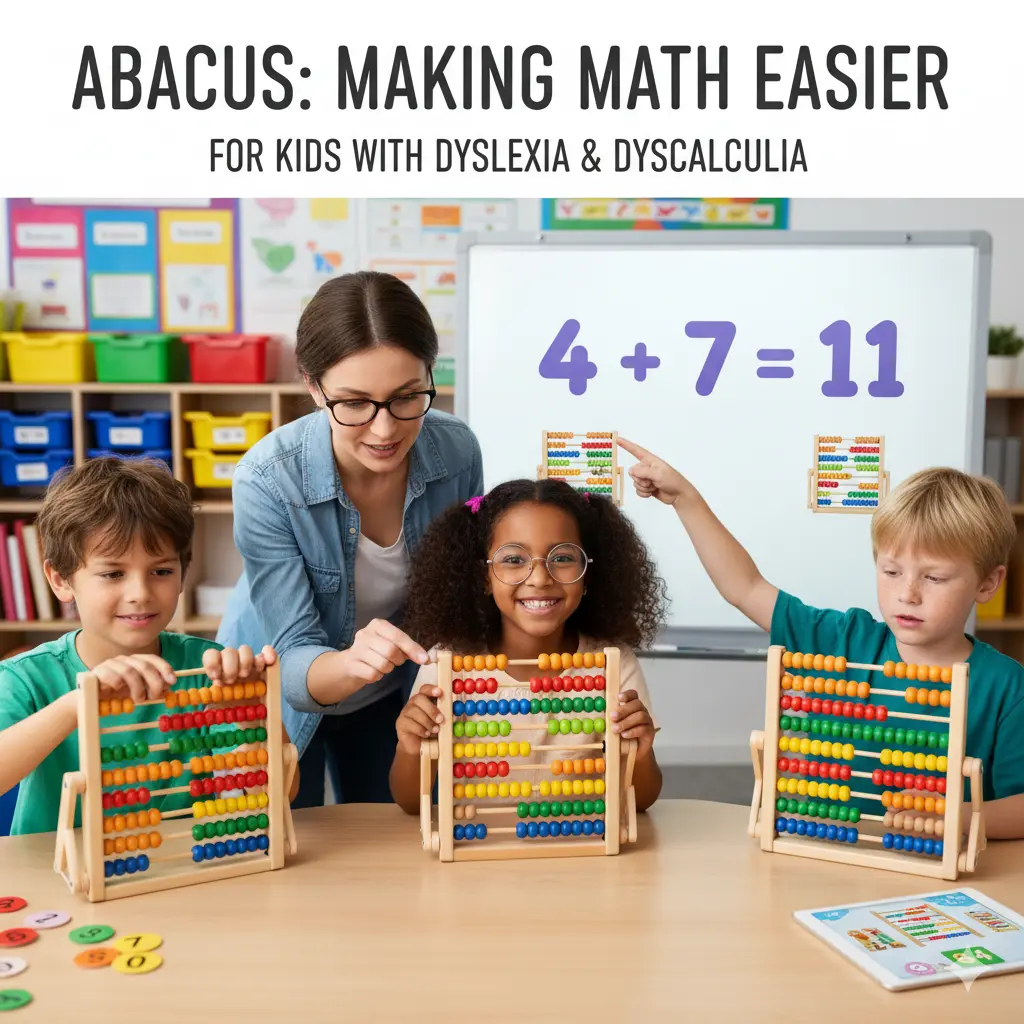Learning mathematics can be challenging for children, especially those with learning differences like dyslexia and dyscalculia. Traditional teaching methods often rely on reading, writing, and memorization, which may not work for every child. This is where the abacus for kids with dyslexia and dyscalculia proves to be transformative. With this hands-on learning tool, children can gain confidence and understanding while developing essential math skills.
At Success Abacus, we focus on creating an inclusive environment where children can thrive. Through structured programs, we provide opportunities to explore how abacus helps in learning math in an interactive and engaging way.
Understanding Dyslexia and Dyscalculia
Dyslexia affects reading and language processing, which can make understanding numbers and math problems challenging. Dyscalculia impacts a child’s ability to comprehend numerical concepts and perform calculations. These learning differences often make traditional classroom methods overwhelming, causing frustration and anxiety.
By integrating tactile and visual learning methods, the abacus for kids with dyslexia and the abacus for dyscalculia allows children to grasp concepts more easily. It transforms abstract numbers into something they can physically manipulate, reducing stress and making math enjoyable.
Why Abacus Works for Kids with Dyslexia
The abacus for kids with dyslexia relies on visual and tactile learning techniques. Instead of only reading numbers, children move beads on the abacus, giving them a physical representation of numbers. This method helps to:
- Strengthen visualization and concentration skills
- Reinforce number concepts without depending heavily on text
- Build confidence while performing calculations
Through consistent practice, children gain a better understanding of mathematical concepts, showing that how abacus helps in learning math goes beyond simple arithmetic.
Benefits of Abacus for Kids with Dyscalculia
Children with dyscalculia often struggle with abstract math. The abacus for dyscalculia provides a hands-on approach to learning, making numbers tangible and operations more understandable. Some benefits include:
- Developing a mental number line and better number sense
- Improving calculation accuracy and speed
- Enhancing memory and sequencing skills
Regular practice demonstrates the abacus training benefits for kids with dyscalculia, boosting both competence and confidence.
How Abacus Enhances Overall Math Learning
Using an abacus is more than just performing calculations. Understanding how abacus helps in learning math encourages holistic development:
- Problem-solving skills: Step-by-step approaches become easier
- Pattern recognition: Bead movements reinforce numerical patterns
- Confidence: Mastery of techniques translates to improved self-assurance
Alongside other math learning tools for dyslexia, the abacus provides a comprehensive method for tackling numerical challenges, making learning engaging and effective.
Math Learning Tools for Dyslexia
The abacus complements other math learning tools for dyslexia, such as visual aids, interactive games, and manipulatives. Together, these tools offer a multi-sensory learning experience, helping children strengthen their numerical understanding and cognitive skills. Combining these resources with abacus lessons enhances the abacus training benefits for kids, leading to improved overall performance in school.
Structured Abacus Classes for Special Needs Children
At Success Abacus, our abacus classes for special needs children are tailored to meet diverse learning requirements. Our instructors ensure that every child progresses at their own pace while mastering essential math skills.
We offer abacus classes in dharashiv, abacus classes in bhandara, abacus classes in ahilya nagar, abacus classes in solapur, abacus classes in sindhudurg, and abacus classes in satara.
These abacus classes for special needs children ensure every child experiences the abacus training benefits for kids, including improved focus, calculation speed, and confidence in math.
Abacus for Improving Math Skills
Even children without learning difficulties can benefit from an abacus. Abacus for improving math skills encourages mental calculation, sharpens arithmetic understanding, and enhances problem-solving abilities. Through practice, children can perform complex calculations mentally, demonstrating how abacus helps in learning math in both simple and advanced ways.
Abacus Training Benefits for Kids
The abacus training benefits for kids extend beyond mathematics:
- Cognitive development: Improves memory, attention, and logical thinking
- Emotional growth: Fosters patience, perseverance, and confidence
- Academic enhancement: Strengthens problem-solving and calculation skills
The abacus for kids with dyslexia and dyscalculia ensures that children gain these benefits while enjoying the learning process.
Conclusion
The abacus is more than a learning tool, it’s a pathway to mastering mathematics for children facing learning challenges. Whether your child has dyslexia, dyscalculia, or simply wants to enhance their math abilities, the abacus for improving math skills provides a practical, interactive, and enjoyable way to learn.
Enroll your child at Success Abacus and let them experience the full abacus training benefits for kids. With the right guidance, your child can develop confidence, sharpen problem-solving skills, and truly enjoy math.
Frequently Asked Questions
1. What is the best age to start abacus training for kids with dyslexia?
The ideal age is usually 5–7 years, but children of all ages can benefit with customized guidance.
2. How does abacus help kids with dyscalculia improve math skills?
It provides a visual and tactile way to understand numbers, making abstract concepts easier to grasp.
3. Can abacus training replace traditional math classes?
No, but it supplements regular classes by reinforcing understanding and improving calculation speed.
4. Are abacus classes suitable for all learning abilities?
Yes, abacus classes for special needs children are designed to accommodate different learning styles.
5. How long does it take to see improvement in math skills?
With regular practice, noticeable improvements usually appear within 3–6 months.
6. Can abacus training help with concentration and memory?
Absolutely. The repetitive nature of abacus exercises strengthens focus and memory retention.
7. Is abacus only useful for addition and subtraction?
No, advanced training covers multiplication, division, and mental calculations.
8. Can online abacus classes help kids with dyslexia and dyscalculia?
Yes, online classes can be effective, especially when personalized attention is provided.
9. Are there different levels in abacus training?
Yes, programs are structured in multiple levels to gradually improve skills and confidence.
10. How can parents support their child’s abacus learning at home?
Encourage daily practice, use visual aids, and celebrate progress to maintain motivation.


